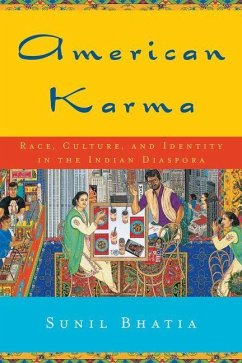The Indian American community is one of the fastest growing immigrant communities in the U.S. Unlike previous generations, they are marked by a high degree of training as medical doctors, engineers, scientists, and university professors.
American Karma draws on participant observation and in-depth interviews to explore how these highly skilled professionals have been inserted into the racial dynamics of American society and transformed into "people of color." Focusing on first-generation, middle-class Indians in American suburbia, it also sheds light on how these transnational immigrants themselves come to understand and negotiate their identities.
Bhatia forcefully contends that to fully understand migrant identity and cultural formation it is essential that psychologists and others think of selfhood as firmly intertwined with sociocultural factors such as colonialism, gender, language, immigration, and race-based immigration laws.
American Karma offers a new framework for thinking about the construction of selfhood and identity in the context of immigration. This innovative approach advances the field of psychology by incorporating critical issues related to the concept of culture, including race, power, and conflict, and will also provide key insights to those in anthropology, sociology, human development, and migrant studies.
American Karma draws on participant observation and in-depth interviews to explore how these highly skilled professionals have been inserted into the racial dynamics of American society and transformed into "people of color." Focusing on first-generation, middle-class Indians in American suburbia, it also sheds light on how these transnational immigrants themselves come to understand and negotiate their identities.
Bhatia forcefully contends that to fully understand migrant identity and cultural formation it is essential that psychologists and others think of selfhood as firmly intertwined with sociocultural factors such as colonialism, gender, language, immigration, and race-based immigration laws.
American Karma offers a new framework for thinking about the construction of selfhood and identity in the context of immigration. This innovative approach advances the field of psychology by incorporating critical issues related to the concept of culture, including race, power, and conflict, and will also provide key insights to those in anthropology, sociology, human development, and migrant studies.
Dieser Download kann aus rechtlichen Gründen nur mit Rechnungsadresse in A, B, BG, CY, CZ, D, DK, EW, E, FIN, F, GR, HR, H, IRL, I, LT, L, LR, M, NL, PL, P, R, S, SLO, SK ausgeliefert werden.

